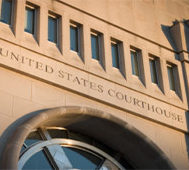 As we previously reported, Regeneron filed a BPCIA complaint against Mylan on August 3, 2022, regarding Mylan’s proposed aflibercept biosimilar. Just two days after filing its Complaint, Regeneron filed a motion requesting an expedited status conference and to schedule a trial for no later than June 2023. Briefing on Regeneron’s motion is now completed, with Mylan’s opposition filed on August 19, and Regeneron’s reply filed on August 23.
As we previously reported, Regeneron filed a BPCIA complaint against Mylan on August 3, 2022, regarding Mylan’s proposed aflibercept biosimilar. Just two days after filing its Complaint, Regeneron filed a motion requesting an expedited status conference and to schedule a trial for no later than June 2023. Briefing on Regeneron’s motion is now completed, with Mylan’s opposition filed on August 19, and Regeneron’s reply filed on August 23.
Regeneron seeks an early trial—only 10 months after filing its complaint—in order to gain the benefit of a statutory permanent injunction available under 35 U.S.C. 271(e)(4)(D). That section of the BPCIA states that “the court shall order a permanent injunction prohibiting any infringement of the patent by the biological product involved in the infringement until a date which is not earlier than the date of the expiration of the patent that has been infringed under paragraph (2)(C), provided the patent is the subject of a final court decision, . . . and the biological product has not yet been approved because of section 351(k)(7) of such Act.” A “final court decision” is defined as one in which “no appeal (other than a petition to the United States Supreme Court for a writ of certiorari) has been or can be taken.” 42 U.S.C. § 262(k)(6)(C)(ii). As Regeneron pointed out in its motion, the statutory provision “contains a critical timing limitation” as it provides relief only when the biosimilar product at issue had not yet been approved by FDA. According to Regeneron, “[b]ecause FDA could approve Mylan’s proposed Eylea® biosimilar in May 2024,” a trial is needed no later than June 2023, “so that Regeneron may avail itself of the relief provided by § 271(e)(4)(D).”
Mylan argued in its response that “[r]ushing to trial in fewer than 10 months on a complex, 24 patent case . . . is not only legally unnecessary, but transparently designed to prejudice Mylan’s ability to engage in meaningful discovery, and will unduly burden both the parties and the Court.” Mylan asserted that “Regeneron’s proposed trial date of June 2023 is simply not feasible,” as Regeneron’s Complaint “puts at issue 566 patent claims across 24 asserted patents stemming from 11 separate patent families with a collective 33 unique inventors, across a wide range of non-overlapping technology areas.” Mylan also argued that “[i]f Regeneron wants to enjoin Mylan prior to any biosimilar launch,“ then Regeneron may file “a motion for preliminary injunction filed within 180 days of Mylan’s notice of commercial marketing based on a showing of possible infringement of a valid patent and consideration of the traditional [eBay] factors for an injunction.”
Although many BPCIA cases have been litigated to date, no courts have issued a statutory permanent injunction under 35 U.S.C. 271(e)(4)(D). In prior BPCIA cases, the statutory injunction was not available because a “final decision,” which includes a decision from the Federal Circuit, had not issued before the biosimilar product received FDA approval.
Stay tuned to Big Molecule Watch as we monitor further developments in this case.

